2006 Norwegian National Championships - Retrospective: Elite Division - Own Choice
16-Feb-2006As with all the best contests, the result was in doubt right up until the last band played on the Saturday. Yep - it really was...
As with the European Championships, the Elite Division places a great deal of emphasis on the ability of its leading bands to pick the right own choice selections to impress not only the enthusiastic audience that fills the Grieg Hall, but more importantly, the three judges ensconced in the tent.
In the past few years that has led to a variety of interesting choices being made, from cutting edge contemporary works such as ‘Trumpet of the Angels' or this year, ‘Guovssahasat' by Per Anders Emilsen and ‘Cantigas' by Torstein Aagaard Nilsen, through to the blockbusters such as ‘Journey to the Centre of the Earth' or ‘Music of the Spheres'. It makes for a thrilling mini contest, with the audience in particular welcoming the new works with much genuine enthusiasm.
The Norwegian bands and their MDs take a great deal of time over the selection of the works they are to use, and this year the ten choices (doubling up is not allowed) were varied to say the least, with three efforts coming from ‘left field' as it were in the Nilsen, Emilsen and Johan Evenepoel's ‘Ginnungagap'.
The slightly cynical amongst us may well think that in some cases the choices were being made more with an eye to who may have been in the box, rather than what possibly suited the individual bands needs, but if they did, it was a brave thing to do.
The bands themselves did not know how the land lay from the Friday night, but most people thought it was going to be a straight fight between Eikanger, Manger and Stavanger for the 2006 title and the invitation to represent their country at the European Championships in Birmingham in 2007.
Of those leading contenders, it was Eikanger Bjorsvik who were up first with their choice of ‘Journey to the Centre of the Earth' by Peter Graham. The selection wasn't much of a surprise given that they were being led by Dr Nicholas Childs, and it didn't come much of a surprise either that they gave it a quite outstanding performance that had the crowd on their feet it at its conclusion.
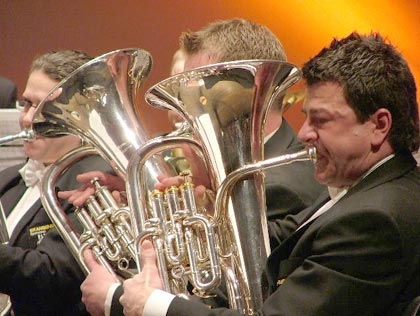
Euph journey: Tormod Flaten tries to get to the Centre of things
The problem however lay not with the band or the MD, but with the piece itself. Although it is undoubtedly a thrilling and effective work to listen to, you do get the nagging feeling that there is a lot of smoke and mirror trickery going on in the score. If it is already a classic of its genre, as someone argued to us on the Saturday night, then it is a bit like David Copperfield – only not the book by Charles Dickens, but the toothy American illusionist of the same name.
This is a piece that amazes us because we are at times coerced into believing what we hear must be amazingly difficult, as it was written especially for Black Dyke who are one of the very best bands in the world. Yet the more you delve into it as a listener the more you see how the brilliance of its façade hides some pretty run of the mill technical and musical challenges. Peter Graham has produced a fantastically vibrant piece of almost brass band film music, yet it is in no way as technically difficult as his ‘Montage' or ‘Harrison's Dream' of musically as stimulating as ‘Essence of Time'. It is though a piece of outstanding musical theatre, and it will be interesting to hear how taxing it is when it is played at the Regional Championships.
Eikanger certainly pulled out all the stops here on it, with some fantastic effects and some sublime music making. The bass trombone in particular was awesomely good, and there were times when the hairs on the back of your neck really did stand on end. If there was a weakness though it showed in a couple of the quieter moments (although not the start, which was spooky), when Martin Winter took over the cornet solo in the love duet with the euph only for the usual solo cornet to take over before its conclusion – a mix that didn't work as the tones of the players was so different.
Still it was a cracking account and we had them as the winners of this section at the end, but only by the narrowest of margins.
It was Manger Musikklag who we had for second place, although the judges had them first. It was hard to quibble though as this was an immense performance from Robert Childs and his band on ‘Cantigas' a new work from the pen of Torstein Aagaard Nilsen, who was in the hall to listen to the premiere and was beckoned onto the stage at the conclusion of the performance to accept and enjoy the applause.
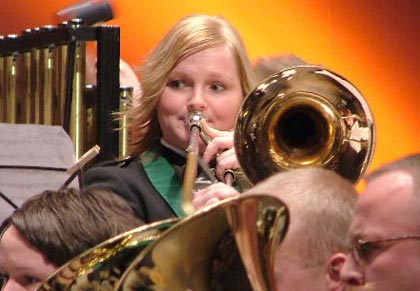
Playing a stunner: Camilla S. Tviet leads Manger into second place
This was breathtaking playing – especially from the euphonium and solo cornet in the opening section and from the quite stunning bass trombone in the extended second movement.
The opening section developed from much of the material that was initially explored by the euph and cornet who were sat directly at the front of the band, whilst to the conductors right the vibraphone added extra colour and texture to a quite exposed ensemble. It was elegiac in composition and delivery and made more impressive by the fact that much of the material was pitched at the extremes of the range for both main solo instruments. Both players were outstanding.
The extended second movement (there were smaller sections within, but not played with a break in the continuity) featured some startling bass trombone work; rich, ripe and plumby right down to the very depths of the range, but all allied to a razor sharp clarity of production. In an age when the vast majority of bass trombone playing in top bands consists of blasting, podgy sounds and a lack of distinct edge (other than sounding like a honking goose on heat) this was something else, and it quite deservedly took the soloist prize for Camilla S. Tveit who was somewhat overcome by it all at the awards presentation.
Robert Childs had certainly done his homework on the piece, and brought an immense amount of detail from the score as well as a lovely sense of broadness, especially in the opening movement. That it scored so highly was not a surprise given the quality of the performance, but it was a little surprising that it scored so clearly over Eikanger's and Stavanger's performances. It was an inspired choice for a number of reasons - some more overtly obvious than others perhaps.
The other performance that did shine of course came from Stavanger under Russell Gray who had chosen (the band, not the MD it transpired) Dr John Pickard's ‘Eden'. Whatever they reason for doing so, it was the right choice all right, as they too produced a wonderful account that was in many ways as good if not better than anything that was given at the Royal Albert Hall last November.
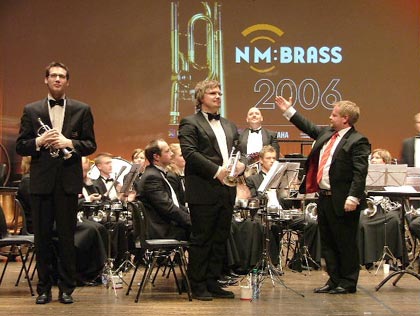
Winners made in Eden: Russell Gray leads the applause for his band
Russell Gray once more allowed the music to have time and space to flow and develop, with a sublime moment just after the start with the pick up to the main thematic line which hung in the air for just a split second long enough to entice your aural senses. After that there was a display of euphonium playing of the highest class, excellent trombone playing and a bass end that drove the band on like a galley drummer on a Roman slave ship. The decent into the depths of despair was as thrilling as it was full of menace, and although the final redemption was a touch nervous in places, it all closed with a huge climactic authority that oozed controlled power.
Third place was what it deserved and third place was what it got, and overall it was just enough to beat off the challenges of the two other ‘Anger' bands and take the title for the third time in four years. This is some band.
These three bands were in a class of their own on the Saturday, although there were a number of fine efforts from others, most notably Krohnengen under the direction of Allan Withington and Sandefjord directed by Ray Farr.
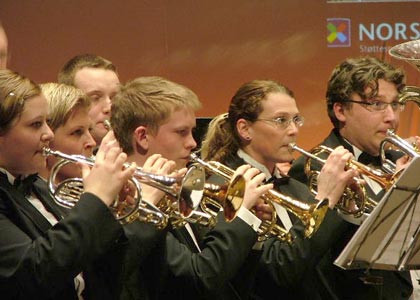
Reach for the stars: Krohnengen cornets take off for the Spheres
Kronhnengen finally got the result their efforts deserved for a fine effort on ‘Music of the Spheres' which although was not in the class of the leading bands and did contain a number of technical faults, was so well shaped by the MD. Throughout, Allan allowed the music to flow, not allowing the tempo to wallow in the lyrical sections and not to over extend itself in the brighter episodes.
His players responded manfully with the soprano player in particular playing with a lovely delicate touch. It just got out of synch at the bell section and tired at the very end, but it was proof enough that given quality direction from the middle here is a band of great potential. The MD is a class act.
Sandefjord Brass Symposium went with Philip Wilby's ‘Music for the Moving Image', which wasn't too much of a surprise given that the MD had directed the work at the World Championships last year in Holland with the Reg Vardy Band.
Ray Farr certainly enjoyed this performance (so much so that at one point his facial response to some lovely cornet playing was like a mime artists plea for the audience to clap) and you can sense why as his players gave a very fine account of a piece that grows on the listener each time you hear it. It was slick and exciting, and contained some fine ensemble work, but just when it could have turned into something special it got a little overcooked, brash and harsh and that lovely sheen was lost. We had it 4th the judges 5th, and that was about bang on the Krone.
Fifth place went to Molde conducted by Garry Cutt, who worked his socks off with the huge ‘Ginnungagap'. This was a brave choice indeed, but one that perhaps took too much out of his players, so that by the end it didn't quite come off. 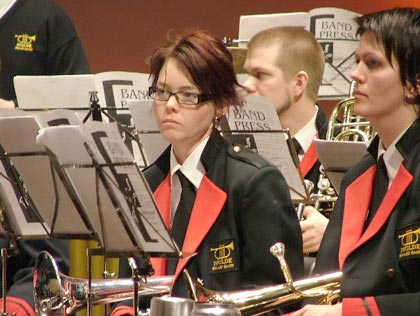
Something to smile about?: Molde's horn section seem a little glum
There was much to admire in places, but just when you thought it was heading for something special it tailed off and by the end Molde sounded an exhausted band.
Ila Brass Band were the other ensemble on the day who opted to try something very new, and more than a bit challenging to catch the ears of the judges. That they did with ‘Guovssahasat', which we were told comes from the Sami people or Laps in the very northern area of Sweden and Finland close to the Arctic circle.
Perhaps the judges gave it the benefit of the doubt, but for us it was a real disappointment as a piece, with no real coherent musical shape or development, and too many players evidently struggling with the technical aspects of the work. It was all too dislocated and austere, and with an obtuse ending it never appealed, even if the audience seemed to like it. We had Ila down for 9th, but the judges had them in a slightly fortunate joint 6th.
Oslofjord had certainly played above themselves on the Friday and unbeknown to them were entering the Saturday in fourth place under the direction of Michael Antrobus. For their own choice selection they went with ‘Whitsun Wakes', and even though the MD was in splendid form minus baton and music, his players were not.
Too many unforced errors, and a distinct lack of balance in the hymn tune sections meant that it all sounded a touch too rough and ready, whilst the decision to bring the cornet and euph to the front of the stage to play their duet section didn't work as the ensemble behind them was out of synch with their intentions. The soprano and baritone drew the performance back on track, but a weak end, which featured an ill timed bass entry left it all a bit flat. Perhaps they had nothing left in the tank after the heroics of the Friday, but this was a wake in more ways than one and they got what they deserved on the day.
The two other disappointing performances came form Tertnes Brass and Jaren Hornmusikkforening.
Tertnes are a young band who have just come up from the First Division and were directed with youthful exuberance by Bjorn Breistein over the two days. There is a great deal of talent within the band for sure, but it is a talent that needs to be nurtured perhaps with a touch more loving care, as their performance of ‘Contest Music' was poor to say the least.
If you are to pick an own choice piece for a band, then it is always a good idea to pick a piece that can accentuate the strengths and not the possible weaknesses of your line up. As ‘Contest Music' is more than ever a piece that places huge demands on the cornets, you do wonder why the MD opted for it when this was perhaps his weakest section. Still, a lesson learnt for the MD, but since the band didn't come bottom in the overall results, it means they can use the experience gained here this year to good effect next time. We hope so.
Finally, Jaren Hornmusikkforening – and what can you say? On the Friday they were excellent and so too was the MD. On the Saturday they were out of musical and technical fuel and the MD was somehow on a different planet. Helge Haukas is one heck of a talent, but by jiminy he certainly takes risks.
This time none of them came off – big style. ‘Montage' is a feral test piece. Just when you think you have it tamed, it just opens its claws, hisses and spits and skaggs you on the bum. This time it sunk it claws into Helge's rear and he found it a painful experience. The technical obstacles were never overcome in the first and third movements, whilst the opaque sense of style in the second was never reached by either the soloists or the MD. Come the ride for home and a side drummer on steroids it very nearly crashed and burned. Helge opted to run off stage and into the auditorium, and we couldn't blame him. Having a great talent is one thing, using it wisely all the time, quite another.
So that was that and all that was left was the giving out of the prizes and some final thoughts, which we will give in our Postcard. It was though an interesting and enjoyable Saturday afternoon in Bergen once again.
Iwan Fox.















